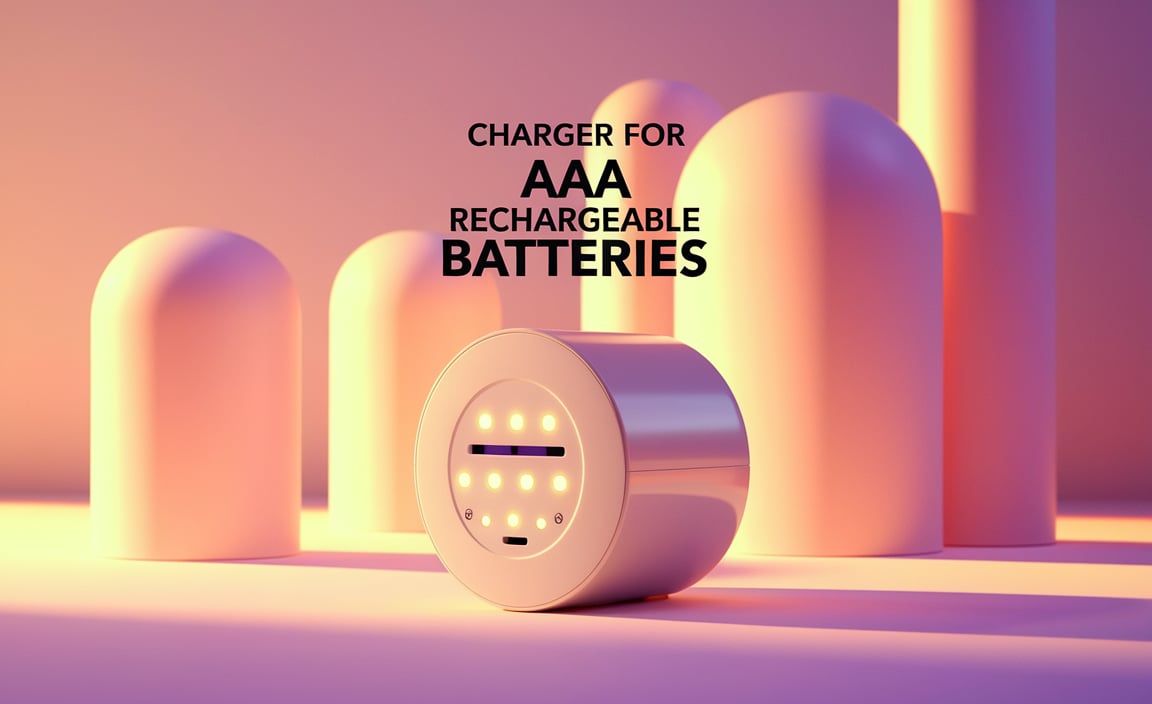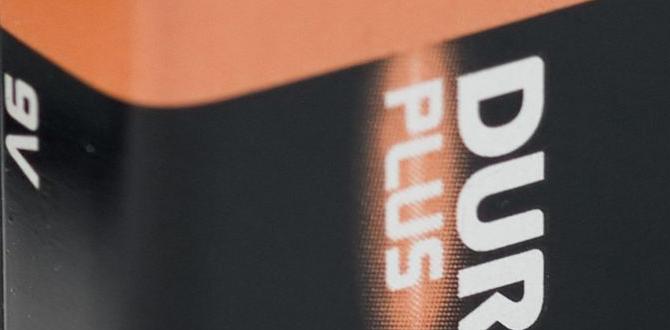Yes, you can sell old batteries for cash! Many places buy used car batteries, and some even accept other types like lead-acid batteries from electronics or industrial equipment. It’s a great way to declutter and earn a little money while helping the environment.
Got a dead car battery sitting in your garage, or wondering what to do with old rechargeable ones? You might be surprised to find out that those old power sources can be worth cash. It’s not just about getting rid of junk; it’s smart recycling and earning a bit of money too. Many common battery types contain valuable materials that recyclers want. This guide will walk you through exactly how to find buyers and get paid for your old batteries, making it simple and straightforward, even if you’ve never done it before.
We’ll cover everything from identifying which batteries can be sold to where to take them, and what to expect. Get ready to turn that old battery into a little extra cash!
Why Sell Your Old Batteries?
Throwing away old batteries is a missed opportunity. Here’s why turning them into cash makes sense:
- Environmental Responsibility: Batteries, especially car batteries, contain materials that can be harmful to the environment if not disposed of properly. Recycling prevents these materials from ending up in landfills.
- Resource Recovery: Many batteries contain valuable metals like lead, cadmium, and nickel. Selling them allows these materials to be recovered and reused, reducing the need for new mining and manufacturing.
- Pocket Money: It’s a simple way to earn a bit of extra cash by recycling items you would otherwise discard.
- Space Clearing: Old batteries can take up valuable space in your garage or shed. Selling them helps you get rid of them responsibly.
What Types of Batteries Can You Sell for Cash?
Not all batteries are created equal when it comes to resale value. The most common and valuable battery type for selling is the car battery, also known as a lead-acid battery. However, other specific types can sometimes be sold too.
Car Batteries (Lead-Acid Batteries)
These are the stars of the show when it comes to selling used batteries. Car batteries are almost universally accepted by scrap metal dealers and dedicated battery recyclers because they contain a significant amount of lead, which is highly recyclable.
- Construction: Car batteries consist of lead plates submerged in an electrolyte solution. The lead is the primary component that gives them value.
- Weight: They are heavy due to the lead content, and you are often paid by weight.
- Identification: Look for labels indicating ‘Lead-Acid Battery’ or symbols associated with car batteries. They usually have a rectangular shape with terminals on top.
Other Batteries (Less Common for Cash)
While car batteries are the most straightforward to sell, some other types might have value, though it’s less common for individuals to earn significant cash from them:
- Rechargeable Industrial Batteries: Large, heavy-duty rechargeable batteries used in forklifts or backup power systems are also lead-acid and can be sold.
- Certain Lithium-Ion Batteries: While home lithium-ion batteries (like those in phones or laptops) are difficult to sell for cash due to recycling complexities and safety concerns, some specialized recyclers might buy them in bulk if you have many. It’s rare for individuals to get cash this way.
- Nickel-Cadmium (NiCd) and Nickel-Metal Hydride (NiMH) Batteries: These are found in older cordless tools or some electronics. While they contain valuable metals, most general scrap yards don’t pay much for them individually. Specialized battery recyclers are a better bet if you have a large quantity.
For most people looking to make quick cash, focusing on old car batteries is the most practical approach.
Where to Sell Your Old Batteries for Cash
Finding a buyer for your old batteries is usually quite easy, especially if you have car batteries. Here are the best places to look:
1. Auto Parts Stores
Many major auto parts retailers offer a core charge on new batteries. When you buy a new one, you pay an extra amount (the core charge) that you get back when you return your old battery. Some stores will also buy old batteries directly, even if you’re not purchasing a new one, though the payout might be less than at a dedicated scrap yard. Always call ahead to confirm their policy.
Examples of places that often accept used batteries:
- Advance Auto Parts
- AutoZone
- O’Reilly Auto Parts
- Pep Boys
2. Scrap Metal Yards / Recycling Centers
Scrap metal yards are probably the most common place to sell old car batteries for cash. They process large volumes of materials and are equipped to handle lead-acid batteries. You’ll typically be paid based on the weight of the battery, primarily for its lead content.
How it works:
- Find a local yard: Search online for “scrap metal yard near me” or “battery recycling near me.”
- Call ahead: Confirm they accept car batteries and what their current prices are. Prices can fluctuate based on the market value of lead.
- Transporting the battery: Ensure you can safely transport the battery. They are heavy and contain corrosive acid.
A good resource for finding recycling centers in the US is the Environmental Protection Agency (EPA), though specific scrap yard listings might require local searches.
3. Tire Shops and Full-Service Mechanic Shops
Similar to auto parts stores, many larger tire shops and reputable mechanic garages deal with batteries regularly. They often have arrangements with recyclers and might buy your old battery, especially if they install new ones. It’s worth asking if they accept old batteries for recycling, even if you aren’t getting service done.
4. Battery Manufacturers and Specialized Recyclers
Some companies specialize in battery recycling and may purchase old batteries directly. These are often larger operations that handle industrial batteries, but some might also buy lead-acid batteries from consumers. This option is less common for individual sellers but is an important part of the recycling infrastructure.
5. Online Marketplaces (Rare for Cash, More for Small Scale)
While not ideal for earning significant cash on lead-acid batteries (due to shipping difficulties and hazardous material regulations), you might find individuals or small operations looking for specific types of older batteries on platforms like Craigslist or Facebook Marketplace. This is more for niche items or very small quantities.
How Much Can You Get for an Old Battery?
The amount you can earn for an old battery depends on several factors, primarily:
- Type of Battery: Car batteries (lead-acid) are the most valuable.
- Weight of the Battery: They are usually paid by weight, and lead is heavy. Average car batteries weigh between 30-50 pounds.
- Current Market Price of Lead: The price of lead fluctuates daily, similar to other commodities. When lead prices are high, you get more money.
- Buyer’s Policy: Different yards or stores offer different rates.
Estimates:
Generally, you can expect anywhere from $5 to $20 for a standard car battery. Some yards might offer more if the lead market is particularly strong or if you have multiple batteries. The payout is often calculated per pound.
Example:
If a scrap yard is buying lead-acid batteries at $0.50 per pound, and your battery weighs 40 pounds, you could potentially earn $20. This is a rough estimate, and actual prices will vary.
Preparing Your Battery for Sale: Safety First!
Batteries contain corrosive acid and can release dangerous gases. Handling them improperly can be hazardous. Always follow these safety precautions:
Safety Gear is Non-Negotiable
- Gloves: Wear sturdy, chemical-resistant gloves (like nitrile or heavy-duty rubber) to protect your hands from acid and lead.
- Eye Protection: Always wear safety glasses or goggles to shield your eyes from splashes or fumes.
- Protective Clothing: Wear old clothes or an apron that you don’t mind getting stained or damaged. Battery acid can ruin fabric.
Handling and Transporting the Battery
- Keep it Upright: Always transport and store the battery in an upright position to prevent acid from leaking out of the vents or terminals.
- Avoid Spills: Be careful not to tip the battery. If a spill does occur, neutralize it immediately with a mixture of baking soda and water.
- Ventilation: When transporting, ensure the battery is in a well-ventilated area. Batteries can sometimes release hydrogen gas, which is flammable.
- Secure the Battery: Place the battery in a sturdy box or container in your vehicle to prevent it from sliding or tipping during transport. A plastic tub or a strong cardboard box works well.
- Cleanliness: Clean any visible dirt or corrosion off the battery terminals and casing before transporting it.
What NOT to Do
- Do not puncture or damage the battery casing.
- Do not attempt to open the battery or tamper with its internal components.
- Do not dispose of batteries in regular household trash or recycling bins.
- Do not smoke or have open flames near batteries, as they can release flammable gases.
Step-by-Step Guide: How to Sell Your Old Car Battery
Ready to turn that old battery into cash? Follow these simple steps:
Step 1: Identify and Assess Your Battery
Determine if you have a sellable battery. For cash, your best bet is a standard car, truck, or deep-cycle lead-acid battery. Check for obvious damage like cracks in the casing. Batteries with severe damage might fetch a lower price or be rejected.
Step 2: Gather Necessary Safety Equipment
Before you even think about moving the battery, put on your gloves and safety glasses. Ensure you have a way to transport it safely (e.g., a sturdy box or a dedicated battery carrier).
Step 3: Locate Potential Buyers
Use online searches or refer to the “Where to Sell” section above to find local auto parts stores, scrap metal yards, or mechanic shops that buy used batteries. Focus on scrap yards for the best cash prices.
Step 4: Call Ahead and Check Prices
This is a crucial step! Call your chosen buyer(s) to:
- Confirm they accept lead-acid batteries from individuals.
- Inquire about their current price per pound or per battery. Prices can change daily.
- Ask about their specific requirements (e.g., do terminals need to be clean? Do they need the battery to be drained?). Most will accept them as-is.
Step 5: Safely Remove the Battery (If Still in Vehicle)
If the battery is still in your car and you’re comfortable doing it, here’s a basic removal guide. If you are unsure, it’s best to have a professional do this or take the car to the buyer who might remove it for you.
- Park on a level surface and engage the parking brake.
- Wear your safety gear.
- Disconnect the negative (black) terminal first using a wrench. Wiggle it gently if it’s stuck.
- Disconnect the positive (red) terminal next.
- Remove the battery hold-down clamp (this can be a bracket or strap at the base of the battery).
- Carefully lift the battery out using a battery carrier strap or by gripping the sides firmly. Batteries are heavy!
- Place the battery in your upright, secure transport container.
- Loosely reconnect the terminals if you plan to start the car again, or cover them to prevent shorts.
Disclaimer: Battery removal can be dangerous. If you are not experienced, seek professional help. Improper disconnection can damage your car’s electronics or cause injury.
Step 6: Transport Your Battery
Load the battery securely into your vehicle, ensuring it stays upright and won’t tip over. Drive directly to the buyer.
Step 7: Sell Your Battery
At the buyer’s location, they will typically weigh the battery or assess its type and condition. They will then pay you the agreed-upon price. Have your ID ready, as some scrap yards require it for transactions.
Table: Comparing Battery Selling Options
Here’s a quick comparison to help you decide where to sell:
| Option | Pros | Cons | Typical Payout | Best For |
|---|---|---|---|---|
| Auto Parts Stores | Convenient (especially when buying new), often offer core charge refunds, some buy outright. | May offer less than scrap yards for outright sales, might require purchase of a new item. | $5 – $15 (core charge refund) or less for outright purchase. | Getting a core charge back when buying a new battery. |
| Scrap Metal Yards / Recyclers | Highest potential cash payout, accept large volumes, straightforward process. | Might require transport to a specific location, prices fluctuate with lead market. | $8 – $20+ per battery (depending on weight and lead prices). | Maximizing cash from old car batteries. |
| Mechanic Shops / Tire Shops | Convenient if you’re already getting service, may offer a small amount. | Payouts can be lower than scrap yards, may prioritize customers. | $3 – $10 (often a goodwill payment). | Easy disposal when getting other car services. |
Common Questions About Selling Old Batteries
Q1: Can I really get cash for my old car battery?
A1: Yes, absolutely! Car batteries are made mostly of lead and plastic, both of which are valuable materials for recycling. Scrap metal yards and many auto parts retailers pay for old lead-acid batteries because they can recover the lead and other components.
Q2: How much is an old car battery worth?
A2: The value varies based on the size and weight of the battery (more lead usually means more money) and the current market price of lead. You can typically expect anywhere from $5 to $20 per battery. Prices can fluctuate, so it’s always best to call ahead to local buyers.
Q3: What’s the best place to sell an old car battery?
A3: Scrap metal yards generally offer the most cash. Auto parts stores are also a good option, especially if you’re buying a new battery and can get your refundable core charge back. Check local listings for scrap yards that explicitly state they buy lead-acid batteries.
Q4: Do I need to do anything to the battery before selling it?
A4: While some places might not care, it’s good practice to wear safety gear when handling it, keep it upright to prevent acid leaks, and wipe off any excessive dirt or corrosion. Some buyers might prefer the terminals to be clean. Most buyers will accept them as-is.
Q5: Is it safe to handle and transport an old car battery?
A5: Yes, with proper precautions. Always wear safety gloves, eye protection, and protective clothing. Batteries contain corrosive sulfuric acid and can release flammable gases. Keep the battery upright during transport and ensure good ventilation. If you’re uncomfortable with the process, it’s safer to have a professional handle it.
Q6: What about old phone batteries or laptop batteries? Can I sell them for cash?
A6: It’s much less common and often not practical for individuals to sell small rechargeable batteries (like those in phones, laptops, or power banks – often lithium-ion) for cash. These batteries are more complex to recycle safely and may not hold enough value for small quantities. Many electronics stores or community recycling events offer free drop-off points for these types of batteries for responsible recycling, rather than cash payment.
Q7: What should I do if I spill battery acid?
A7: If you spill battery acid on yourself or surfaces, act fast. For skin contact, rinse immediately with plenty of cool water. For surfaces or spills, neutralize the acid with a mixture of baking soda and water until it stops fizzing. Then, clean the area thoroughly. Always wear protective gear when handling batteries.
Recycling and Environmental Impact
Selling your old batteries isn’t just about making money; it’s a crucial part of responsible waste management. Lead-acid batteries, in particular



